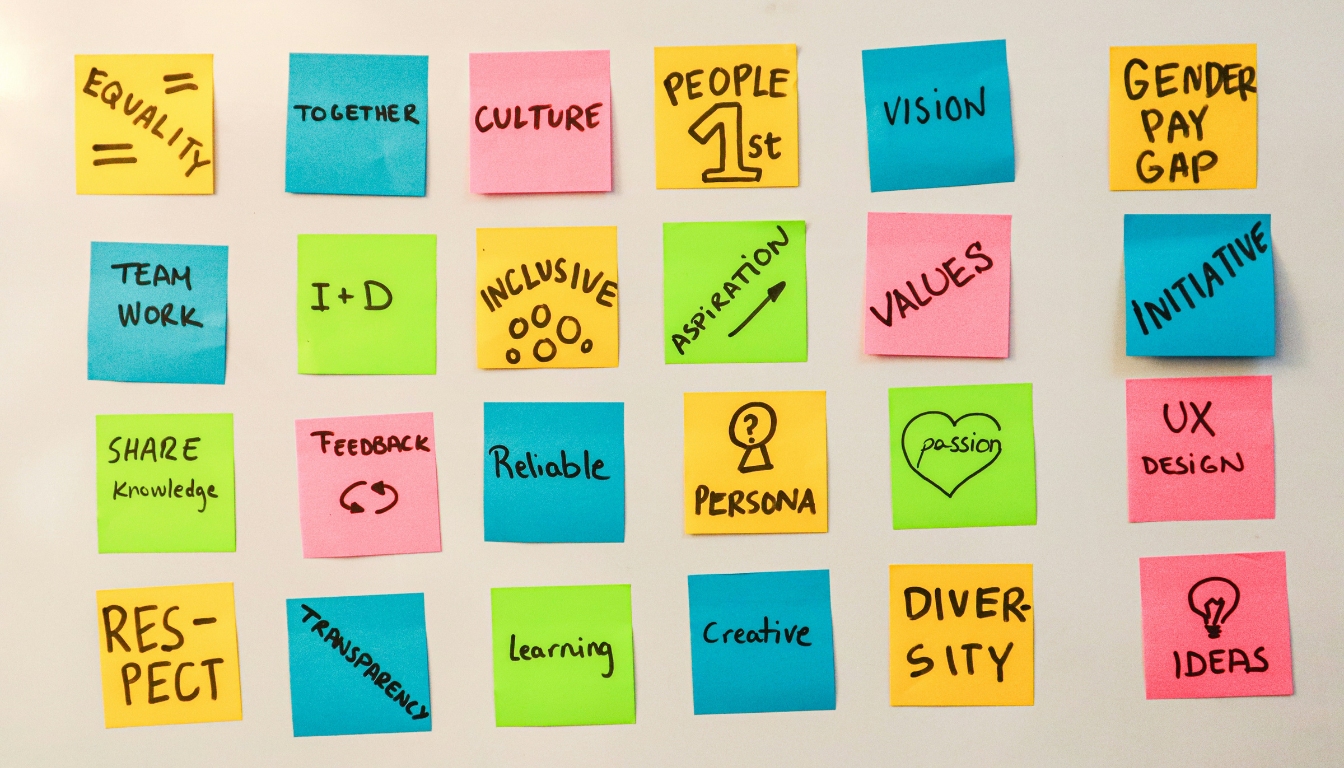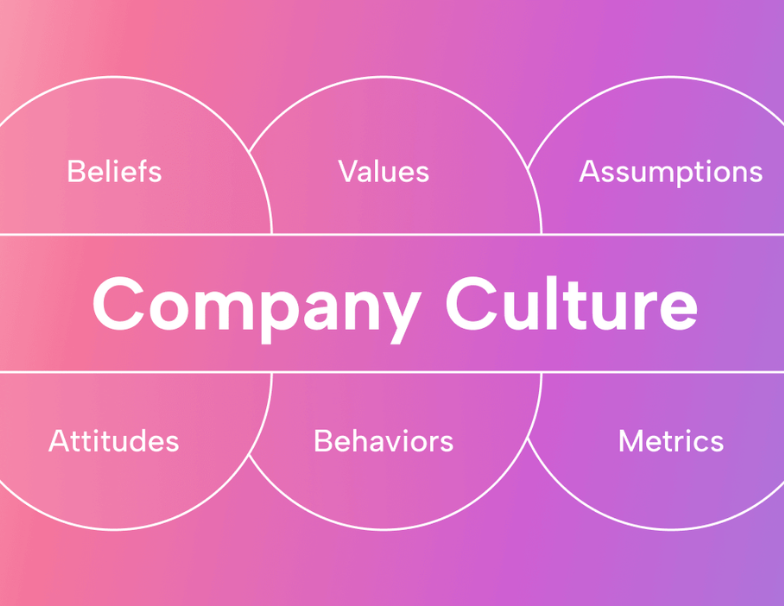4 Crucial Company Elements for Building a Positive Workplace Culture

What are the key company elements that build a successful workplace? This article will explore five crucial elements that contribute to a positive company culture.
Key Takeaways
- Core values are essential for defining company culture and should be integrated into hiring and daily operations to enhance employee retention and satisfaction.
- Effective leadership is vital in shaping workplace culture; leaders must embody core values and prioritize employee well-being to foster a positive environment.
- Open communication and employee recognition programs significantly boost engagement, morale, and productivity in the workplace, contributing to a supportive corporate culture.
Core Values

Core values guide behaviors and help create a cohesive organizational identity. They influence interactions with customers and stakeholders, defining the company’s identity. When employees align with these values, it establishes a foundation for a positive company culture.
Hiring individuals who resonate with core values ensures that new hires are both skilled and aligned with the organization’s mission. Embedding core values into recruitment, performance reviews, and daily operations helps maintain a strong workplace culture, leading to better employee retention and satisfaction.
Shared values foster better communication and reduce potential conflicts within the organization. When employees share common organizational values, it enhances their commitment to company goals, creating a strong sense of belonging and alignment.
Core values can enhance brand reputation and build customer trust, providing a competitive advantage. Employees acting as brand ambassadors and displaying company values strengthen the overall corporate culture.
Core values serve as the DNA of an organization, defining its company’s culture and influencing every aspect of business performance, cultural values, key components, core elements, and employee experience.
Leadership Influence

Leaders shape the organization’s culture by embodying its values and practices. When leaders fail to reflect these values, it undermines cultural efforts and can lead to employee disillusionment. Effective leadership fosters a positive workplace culture and ensures organizational success.
Supportive, motivational leaders who embody core values foster trust, motivate teams, and set an example of ethical conduct. Genuine engagement with team goals and challenges promotes a sense of belonging and alignment with the company’s mission.
Leaders should prioritize employee well-being, growth, and professional development to create a nurturing workplace. A focus on mentoring, coaching, and recognizing contributions builds trust and enhances team morale through team building exercises. Shared goals and transparency boost teamwork and organizational alignment, fostering effective leadership development.
A positive culture stems from employees’ interactions and experiences with their immediate leaders. Clear communication about the impact of employees’ work enhances pride and engagement. Effective leadership practices significantly influence overall organizational culture and contribute to a thriving culture, fostering a strong culture and shaping the organization’s culture, all of which are essential for a healthy culture and a positive company culture.
Incorporating opportunities for leadership development and team alignment—such as those offered through Offsite—can further reinforce these practices by providing structured environments for leaders and teams to connect, reflect, and strengthen cultural cohesion. Effective leadership involves inspiring employees, fostering engagement, and creating an environment where employees feel valued and motivated, not just decision making.
Open Communication Channels
Open communication allows employees to share thoughts freely, enhancing workplace trust and creating a culture of psychological safety. Transparent communication is essential for a positive workplace culture.
Organizations that foster open communication typically experience lower employee turnover. Regular updates and discussions improve engagement, while effective communication strategies help employees understand their roles and company goals, boosting productivity and minimizing misunderstandings. Additionally, when employees interact openly, it further enhances collaboration and teamwork.
Open communication fosters creativity by encouraging ideas and feedback contributions. Investing in communication tools facilitates better information sharing, while regular feedback mechanisms enhance relationships and collaboration between teams.
Open communication channels are vital for building a strong organizational culture, ensuring employees feel heard, valued, and engaged in the company’s mission.
Employee Recognition and Rewards

Organizations with strong employee recognition programs typically see increased profitability. Recognized employees are more likely to display company values and act as brand ambassadors. Recognition enhances employee engagement and fosters a positive workplace culture.
More than half of U.S. employees feel they don’t receive sufficient recognition. Continuous recognition for achievements significantly increases engagement. A well-designed recognition program creates a culture of appreciation and boosts morale.
Recognition can include appreciation posts, work perks, promotions, and personalized experiences. Leadership should spearhead recognition efforts to foster a positive culture. Proper recognition makes employees four times more likely to achieve engagement.
85% of HR leaders believe recognition programs positively affect business culture. Recognizing employees boosts morale and motivation, enhancing overall engagement.
Employee recognition and rewards are indispensable for a thriving organizational culture, ensuring employees feel valued and motivates employees, leading to greater job satisfaction and organizational success.
Work-Life Balance Initiatives

Prioritizing work-life balance creates a supportive organizational culture and enhances employee well-being. Employees satisfied with workplace dynamics and work-life flexibility are 2.6 times more likely to be happy in their jobs, leading to positive employee experiences and employee satisfaction. These initiatives are essential for engagement and customer satisfaction.
Programs supporting work-life balance enhance productivity and decrease turnover, creating a more effective workplace for making business decisions. Valuing well-being is linked to lower turnover rates and long-term satisfaction. Flexible hours or remote work options promote balance and are essential for engagement in performance management and human resources.
Work-life support programs can increase organizational diversity. Employees with work-life support report better mental and physical health, positively impacting culture. 82% of employees expect employers to support work-life balance, highlighting its importance.
Workplace flexibility makes employees more dedicated and invested in their roles. Organizations can provide employees support for mental health through counseling, mental health days, and stress management programs, aiding work-life balance. Meaningful recognition mitigates burnout and absenteeism, contributing to a healthier work environment.
Work-life balance initiatives are key to a positive organizational culture and a positive work environment, contributing to a great company culture. They ensure employees feel supported and valued, leading to higher engagement and retention rates.
Summary
Building a positive workplace culture requires a holistic approach that encompasses core values, leadership influence, open communication channels, employee recognition and rewards, and work-life balance initiatives. Each of these elements plays a critical role in creating an environment where employees feel valued, engaged, and motivated. By focusing on these key components, organizations can foster a thriving culture that drives business success and employee satisfaction. Facilitated experiences such as offsite retreats—coordinated through platforms like Offsite—can serve as effective tools in reinforcing these cultural pillars by offering dedicated time and space for team building, strategic alignment, and reflection.
FAQs
- What are core values, and why are they important?
Core values are essential guiding principles that shape an organization's behavior and identity, influencing interactions with customers and stakeholders. Their importance lies in fostering cohesion and providing a foundation for decision-making and culture within the company.
- How do leaders influence organizational culture?
Leaders significantly influence organizational culture by embodying and promoting the organization's values, which directly affects employee morale and engagement. Their actions and communication set the tone for the workplace environment.
- Why is open communication important in an organization?
Open communication fosters trust and psychological safety within an organization, which ultimately results in lower employee turnover, increased productivity, and greater engagement. By promoting transparent dialogue, organizations can cultivate a more motivated and stable workforce.
- How does employee recognition impact company culture?
Employee recognition significantly enhances company culture by boosting morale, motivation, and engagement. Recognized employees tend to embody company values and serve as brand ambassadors, fostering a more positive workplace environment.
You may also like
Unique spaces for your next offsite
Find distinctive venues for your upcoming corporate retreat.
Stay Updated with Our Insights
Get exclusive content and valuable updates directly to you.







